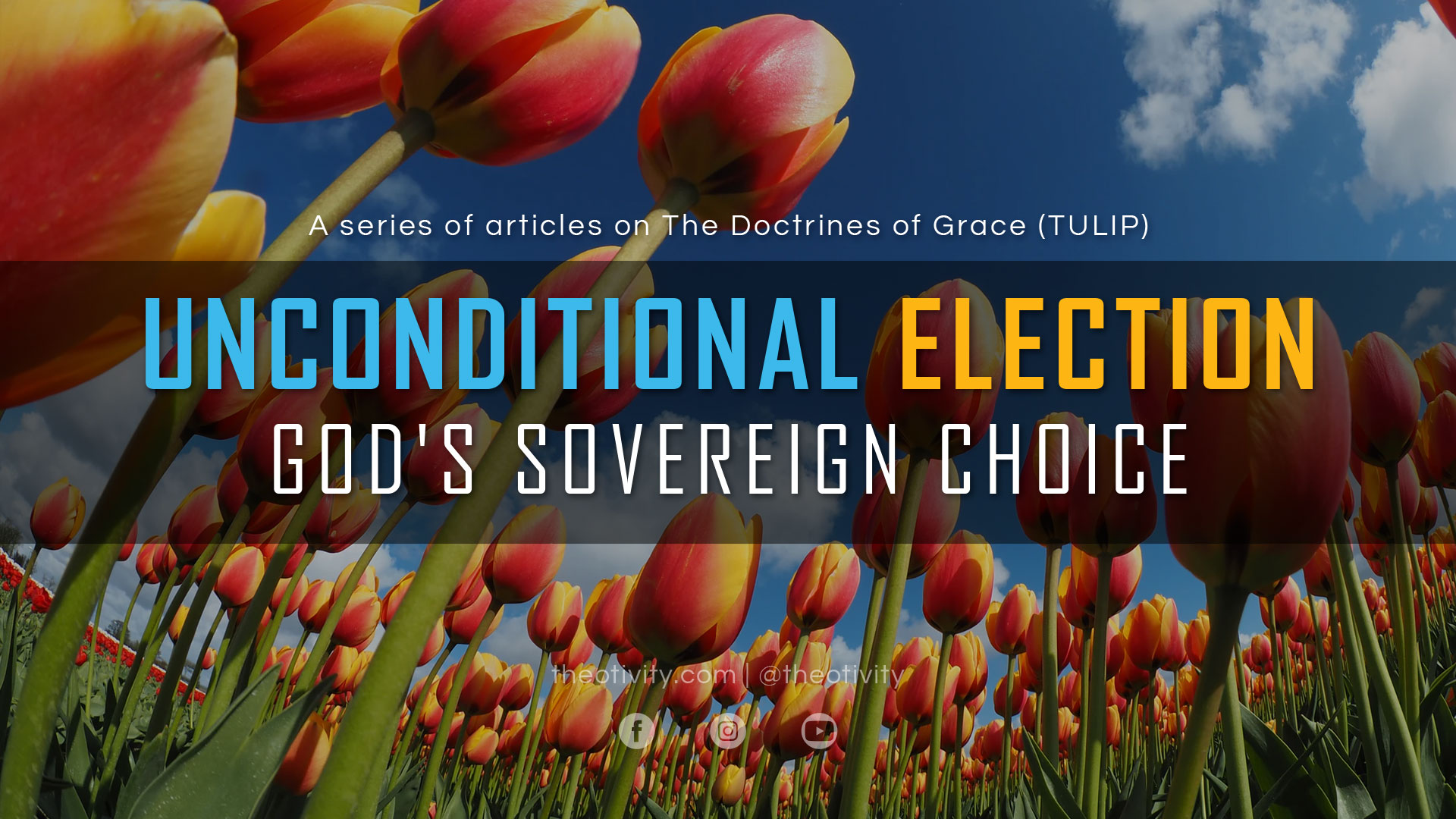You can listen to the first part of this series here.
In our last article, we considered the “T” in the TULIP of Total Depravity or our Radical Corruption by sin. In this article, we’ll take a look at Unconditional Election or God’s Sovereign Choice to save. Many internet debates have been fought over election and predestination. However, as with all doctrines, the deciding factor must be, “what is the clear teaching of Scripture?” This is what we will focus on here.
The Arminian Position on God’s election is generally based on God’s foresight of man’s faith (there are some Arminian theologians who differ, but this is the view of Classical Arminianism). It asserts that, before the foundation of the world, God foresaw that certain people would, of their own free will, choose Christ and thus He chose them for salvation. However, one must ask, in what meaningful sense is it God’s sovereign choice if it is contingent on Him foreseeing man’s choice?
In contrast, the Reformed Position is that God’s election is unconditional. God’s sovereign choice of certain individuals for salvation was not based on any foreseen response of obedience on their part but was based solely on His good and sovereign will. Concerning this doctrine of election, C.H. Spurgeon commented,
“whatever may be said about the doctrine of election, it is written in the Word of God as with an iron pen, and there is no getting rid of it.”
Perhaps part of our aversion to this doctrine of election is that the word is associated for modern ears to our conception of democracy. Everyone gets a vote. However, we must not impose our societal norms or preferences onto the Biblical text. The Bible was written in a world much different to ours, yet its truth also transcends any one culture. We must let the Word speak. So, to the Word we now turn…
The Scriptural Support
The Biblical case for Unconditional Election or God’s Sovereign Choice can be summarized in four points:
1. God has chosen to grant salvation to an elect people
The elect are a specific group of people whom God has chosen to save. This concept is not just a New Testament one, but has its roots from the beginning of God’s dealings with His people.
Moses affirms God’s gracious choice in election in Deuteronomy 10:15, “Yet the Lord set his heart in love on your fathers and chose their offspring after them, you above all peoples, as you are this day.” God’s choice is upon those whom He has set His love upon. Even from Abraham, out of whom God would bring his Covenant people, Israel, God’s sovereign choice is at work. This is affirmed in Nehemiah 9:7, “You are the LORD, the God who chose Abram and brought him out of Ur of the Chaldeans and gave him the name Abraham.” It was not Abraham who chose God, but God who chose him. Prior to God calling him out of Ur, he was just another pagan. God’s choice is gracious (cf. Rom. 11:5).
Jesus affirms that the elect are chosen for salvation in his prediction of judgment upon Jerusalem in the Olivet Discourse (Matthew 24:22-24,31), and in John 6:37-39 Jesus confirms that the elect are those whom the Father has given to him:
“All that the Father gives Me will come to Me, and the one who comes to Me I will certainly not cast out. For I have come down from heaven, not to do My own will, but the will of Him who sent Me. This is the will of Him who sent Me, that of all that He has given Me I lose nothing, but raise it up on the last day.”

Note what is clearly said by our Lord. ALL who are given by the Father to the Son WILL COME to him and he will lose NONE of them, but raise them up on the last day. This is the sure election of God for the salvation of His people. In John 15:16 Jesus says, “you did not choose me, but I chose you and appointed you that you should go and bear fruit…” Jesus again confirms the election of a specific people in his High Priestly Prayer found in John 17 where he says,
“I am praying for them. I am not praying for the world but for those whom you have given me, for they are yours.”
Jesus’s intercession is specific. He is praying for those whom the Father has given him. It is a definite group he has in mind. The alternative interpretation would be absurd as it would posit that Jesus prays for an undefined group that the Father doesn’t know He’s giving to Him until He foresees that they will choose Him anyways – but then why the need to pray for them?
The apostle Paul also confirms this doctrine. In Romans 8:28-33, he says that all things work together for good for those who are called (elect) because those who are foreknown by God, are also predestined to be conformed to Christ’s image, justified and eventually glorified. Because of this Paul exalts in the confidence the Christian has saying,
“If God is for us, who is against us? He who did not spare His own Son, but delivered Him over for us all, how will He not also with Him freely give us all things? Who will bring a charge against God’s elect? God is the one who justifies…” (Romans 8:31b-33)
Notice that it is the same group of people that Paul is talking about. The same group that is predestined is the same group that is ultimately glorified and this is his reason for such confidence for God’s elect.
In his letter to the Ephesians Paul says that God “chose us in Him before the foundation of the world” (1:4), “having predestined us to adoption as sons by Jesus Christ to Himself, according to the good pleasure of His will” (v.5). This election is from eternity past and according to God’s good pleasure and “according to the purpose of Him who works all things according to the counsel of His will” (v.11).
The apostle Peter writes to Christians who are dispersed, “who are chosen according to the foreknowledge of God the Father” (1 Peter 1:1b-2a). Later in his letter he says that those who stumble over Christ, “stumble because they disobey the word, as they were destined to do” (v.2:8b). However, for his audience of Christians he calls them a “chosen race” (v.9) who are now God’s people who have received His mercy (v.10). The apostle John in his Apocalypse confirms that it is the ones whose names have been written in the book of Life who are faithful to God (Revelation 13:8).
2. God’s choice is not based upon any merit
God’s choice of whom He saves has always been based upon His goodness and grace, not on any foreseen merit in us. God does not look down the corridors of time and see that we will choose Him and then choose us. God chooses apart from any merit in us. He chooses not because we are good, but because He is good. This was true even in the Old Testament, as Moses confirms in Deuteronomy 7:6-8,
“For you are a people holy to the Lord your God. The Lord your God has chosen you to be a people for his treasured possession, out of all the peoples who are on the face of the earth. It was not because you were more in number than any other people that the Lord set his love on you and chose you, for you were the fewest of all peoples, but it is because the Lord loves you and is keeping the oath that he swore to your fathers, that the Lord has brought you out with a mighty hand and redeemed you from the house of slavery, from the hand of Pharaoh king of Egypt.”
God’s choice is often quite opposite to what the world would have considered prudent. He chooses what is often considered foolish to shame the wise,
“God chose what is foolish in the world to shame the wise; God chose what is weak in the world to shame the strong; God chose what is low and despised in the world, even things that are not, to bring to nothing things that are, so that no human being might boast in the presence of God.” (1 Corinthians 1:27-28)
This is because the purpose of God’s choice is His own glory and not ours. Thus, the doctrine of election excludes all boasting from our lips. We were not chosen because we were better than anyone else – in fact, often quite the opposite! Paul considered himself the “chief of sinners” (1 Timothy 1:15) and many others who have been saved by God’s amazing grace would likewise consider themselves totally undeserving.

God’s election is “not because of our works but because of His own purpose and grace, which He gave us in Christ Jesus before the ages began” (2 Timothy 1:9). Paul makes this point emphatically in his argument in Romans 9:11 about God’s choice of Jacob over Esau that, “though they were not yet born and had done nothing either good or bad—in order that God’s purpose of election might continue, not because of works but because of him who calls.” Thus, it is clear that God’s election is a gracious choice not based on works whether actual or foreseen. The conclusion that Paul draws in verse 16 is, “So then it depends not on human will or exertion, but on God, who has mercy.”
3. Faith and good works are a result of God’s election
Saying that faith, whether actual or foreseen, is the basis of our election is getting things backward. The Bible shows us exactly the opposite – that we believe because we were predestined/elected/chosen.
In Acts 13:48, through Paul’s preaching to the Gentiles, it was “as many as were appointed to eternal life” who believed. In his letters to the church in Thessalonica, Paul tells them that they know their election (1 Thess. 1:4) because, “our gospel did not come to you in word only, but also in power, and in the Holy Spirit and in much assurance”(v.5a) and that God did not appoint them to wrath but rather salvation through Jesus (5:9). The fact that the Gospel was effectual to salvation in the church in Thessalonica showed Paul that God had chosen them. In his second letter to the Thessalonians, he describes them as “brethren beloved by the Lord, because God from the beginning chose you for salvation through sanctification by the Spirit and belief in the truth”(2 Thess. 2:13b).
Paul states clearly that we who have trusted in Christ are “to the praise of His glory” (Ephesians 1:12). Later in 2:10 he says that, “we are His workmanship, created in Christ Jesus for good works, which God prepared beforehand that we should walk in them.” Our good works are a result of God’s election. Paul goes even so far as to say that, “For to you it has been granted on behalf of Christ, not only to believe in Him, but also to suffer for His sake” (Philippians 1:29). The word translated “it has been granted” comes from the same Greek root as grace – literally, it has been graced to us to both believe in Christ and suffer for his sake.
Some object that this view of election would make us lazy and passive since God has predetermined everything. However, that’s not how Paul argues. Later in Philippians 2:12-13 he says,
“Therefore, my beloved, as you have always obeyed, so now, not only as in my presence but much more in my absence, work out your own salvation with fear and trembling, for it is God who works in you, both to will and to work for his good pleasure.”
Far from being a discouragement from effort, Paul sees it as the basis of Spirit-empowered effort. It is because God is working in us both the desires (will) and ability (work) that we work out our salvation. He assumes that we’re already saved and this is the outworking of that salvation. The apostle Peter makes a similar argument in 2 Peter 1 where he says that God’s power has granted to us all things that pertain to life and godliness (v.3), thus we should make every effort to grow in faith, maturity and fruitfulness (v.5-8), and to be diligent to confirm our calling and election by doing so (v.10). Notice that Peter doesn’t say that these things produce our calling and election, but rather that they confirm it. They are the necessary outworking of true salvation. It is the same argument that James makes that “faith without works is dead” (James 2:14-26) – that is, it is not true saving faith.
4. God’s foreknowledge is of particular persons
Some argue that God’s foreknowledge and predestination is of undefined people groups, not specific persons. However, the Biblical term foreknow – προγινώσκω [proginóskó] (used in Rom. 8:29) is used of particular persons and its normal usage means “to forelove, to set regard upon, to know with a particular interest, to set his affections upon.”
For example, in rebuking His people, God says through the prophet Amos, “You only have I known of all the families of the earth; Therefore I will punish you for all your iniquities.” (Amos 3:2) Of the prophet Jeremiah, God tells him, “Before I formed you in the womb I knew you; Before you were born I sanctified you; I ordained you a prophet to the nations.” (Jeremiah 1:5)
Christ’s rejection of false believers on the Last Day is based on him knowing them. He says in Matthew 7:22-23,
“On that day many will say to me, ‘Lord, Lord, did we not prophesy in your name, and cast out demons in your name, and do many mighty works in your name?’ And then will I declare to them, ‘I never knew you; depart from me, you workers of lawlessness.’”

Paul affirms that our love of God is proof that we are known by Him in 1 Corinthians 8:3. He affirms that “The Lord knows those who are His” in 2 Timothy 2:19. Of Christ, the apostle Peter says, “He was foreknown before the foundation of the world but was made manifest in the last times for the sake of you.” (1 Peter 1:20) Clearly, Peter is talking about God knowing someone specific – Christ in this case. Thus, God’s foreknowledge is of specific individuals. This is one of the Christian’s great treasures – that they have been foreknown and loved from all eternity past by their God! Geerhardus Vos said it best,
“The best proof that He will never cease to love us lies in that He never began.”
The Westminster Confession of Faith summarizes it this way,
“Those of mankind that are predestined to life, God, before the foundation of the world was laid, according to His eternal and immutable purpose, and the secret counsel of good pleasure of His will, has chosen, in Christ, to everlasting glory, out of His mere free grace and love, without any foresight of faith, or good works, or Perseverance in either of them, or any other thing in the creature, as conditions, or causes moving Him thereunto; and all to the praise of His glorious grace.” (Westminster Confession of Faith III,5)
This doctrine of God’s sovereign and gracious election is reason for the Christian’s confidence in their salvation (because God will never go back on His choice), encouragement for working heartily for the Lord, and assurance that He loves them specifically with an everlasting love from since eternity past! It is part of God’s secret counsel – meaning that it is not up to us to try to figure out the elect – that knowledge belongs to the Lord (Deut. 29:29). However, we know that someone is elect when they respond with true faith to the Gospel – and that is the means by which God has given us to reveal those who are His (Romans 10:14-17).
Thanks for reading! I hope that this article blessed you and helped deepen your understanding of God’s unconditional and gracious election of undeserving sinners like us. Our next article in this series will consider what is probably the most contentious of the five points of the Doctrines of Grace – Limited Atonement or Definite or Particular Redemption.
If you’ve found these articles educational or edifying, please consider sharing them with others so that they may be blessed as well.
Soli Deo Gloria!
Articles in this series:



